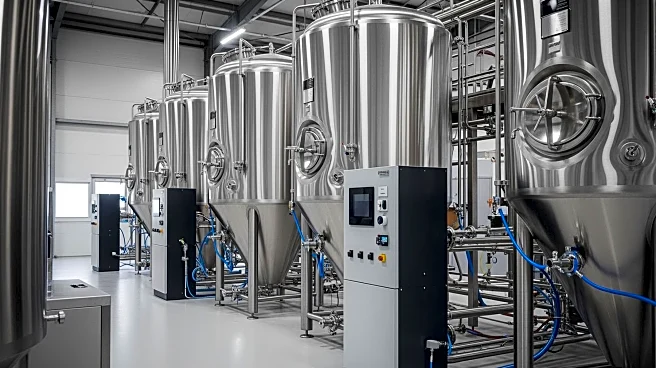What's Happening?
A growing number of breweries, including well-known names like Guinness and New Belgium Brewing, are investing in heat pumps to replace or supplement traditional gas boilers. This move is part of their efforts to achieve net-zero emissions. Heat pumps,
which transfer heat with high efficiency, are being used to generate steam necessary for various brewing processes. AtmosZero, a company focused on electrifying steam production, has developed a cost-competitive solution that allows breweries to produce steam without relying on gas-powered boilers. New Belgium Brewing has already installed an industrial electric boiler capable of generating up to one ton of steam per hour, which could significantly reduce their greenhouse gas emissions if powered by clean energy.
Why It's Important?
The adoption of heat pumps by breweries is significant as it represents a shift towards more sustainable industrial practices. The brewing industry, which heavily relies on steam, contributes substantially to industrial emissions. By transitioning to electrified steam production, breweries can reduce their carbon footprint and operational costs. This change not only supports environmental goals but also aligns with broader industry trends towards sustainability. However, the transition faces challenges such as high capital costs and a lack of widespread understanding of the technology. Programs offering grants and subsidies could play a crucial role in overcoming these barriers, making the technology more accessible to a wider range of manufacturers.
What's Next?
As breweries continue to explore and adopt heat pump technology, the focus will likely be on measuring the performance and reliability of these systems. Successful implementation could lead to broader adoption across the industry. Additionally, the development of supportive policies and financial incentives at the state and local levels could further encourage the transition. Companies like AtmosZero and Skyven are working to address cost barriers and provide solutions that integrate with existing systems, reducing the risk associated with new technology adoption. The ongoing commitment to clean energy by utility providers will also be crucial in maximizing the environmental benefits of these technologies.
Beyond the Headlines
The shift towards electrified steam production in breweries could have broader implications for other industries that rely on steam, such as food and beverage, ethanol, and pulp and paper. As these sectors explore similar technologies, there could be a ripple effect leading to significant reductions in industrial emissions. Moreover, the success of these initiatives could drive innovation and investment in clean energy technologies, contributing to a more sustainable industrial landscape. The collaboration between technology providers and manufacturers will be key in overcoming technical and financial challenges, paving the way for a cleaner future.

















